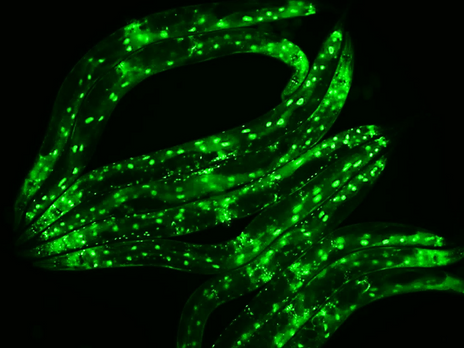Scientific Highlights
Articles
Jalles, A.*, Vieira, C.*, Pereira-Sousa, J., Vilasboas-Campos, D., Mota, A. F., Vasconcelos, S., Ferreira-Lomba, B., Costa, M. D., Da Silva, J. D., Maciel, P., & Teixeira-Castro, A. (2022). Aripiprazole Offsets Mutant ATXN3-Induced Motor Dysfunction by Targeting Dopamine D2 and Serotonin 1A and 2A Receptors in C. elegans. Biomedicines, 10(2), 370. https://doi.org/10.3390/biomedicines10020370
Pereira-Sousa, J., Ferreira-Lomba, B., Bellver-Sanchis, A., Vilasboas-Campos, D., Fernandes, J. H., Costa, M. D., Varney, M. A., Newman-Tancredi, A., Maciel, P., & Teixeira-Castro, A. (2021). Identification of the 5-HT1A serotonin receptor as a novel therapeutic target in a C. elegans model of Machado-Joseph disease. Neurobiology of disease, 152, 105278. https://doi.org/10.1016/j.nbd.2021.105278
Esteves, S.*, Oliveira, S.*, Duarte-Silva, S., Cunha-Garcia, D., Teixeira-Castro, A., & Maciel, P. (2019). Preclinical Evidence Supporting Early Initiation of Citalopram Treatment in Machado-Joseph Disease. Molecular neurobiology, 56(5), 3626–3637. https://doi.org/10.1007/s12035-018-1332-1
Ashraf, N. S., Duarte-Silva, S., Shaw, E. D., Maciel, P., Paulson, H. L., Teixeira-Castro, A., & Costa, M. D. C. (2019). Citalopram Reduces Aggregation of ATXN3 in a YAC Transgenic Mouse Model of Machado-Joseph Disease. Molecular neurobiology, 56(5), 3690–3701. https://doi.org/10.1007/s12035-018-1331-2
Teixeira-Castro, A.*, Jalles, A.*, Esteves, S.*, Kang, S., da Silva Santos, L., Silva-Fernandes, A., Neto, M. F., Brielmann, R. M., Bessa, C., Duarte-Silva, S., Miranda, A., Oliveira, S., Neves-Carvalho, A., Bessa, J., Summavielle, T., Silverman, R. B., Oliveira, P., Morimoto, R. I., & Maciel, P. (2015). Serotonergic signalling suppresses ataxin 3 aggregation and neurotoxicity in animal models of Machado-Joseph disease. Brain: a journal of neurology, 138(Pt 11), 3221–3237. https://doi.org/10.1093/brain/awv262
Funding and Awards
Fundação Luso-America para o Desenvolvimento (FLAD) Long term Fellowship (2006)
Rafael Hervada Award (2010)
National Ataxia Foundation (NAF) Research Award (USA) (2016, 2018, 2021)
Ataxia UK Research Award (2022)
Patents
“Citalopram or escitalopram for use in the treatment of neurodegenerative diseases” (EP3069718A1)











